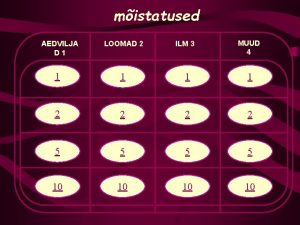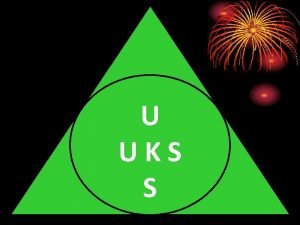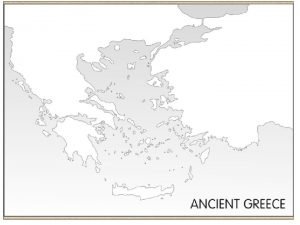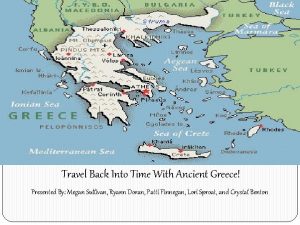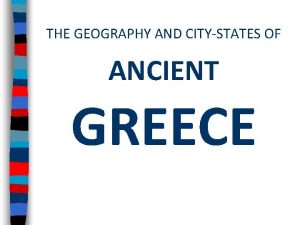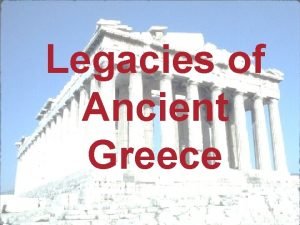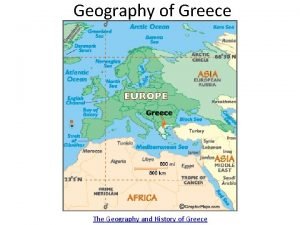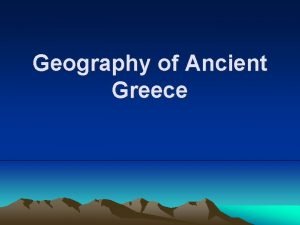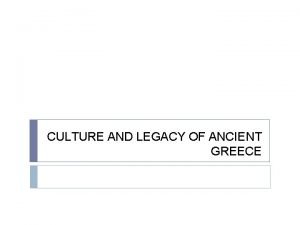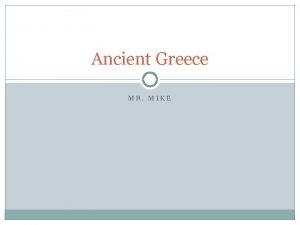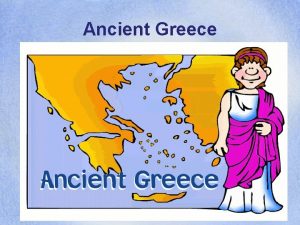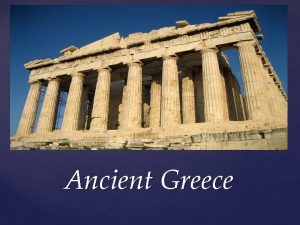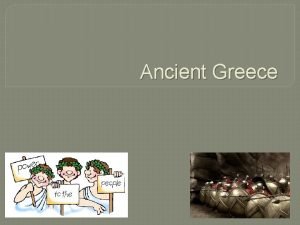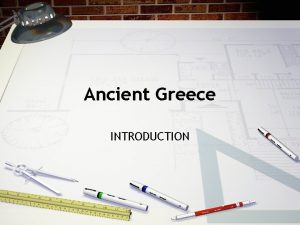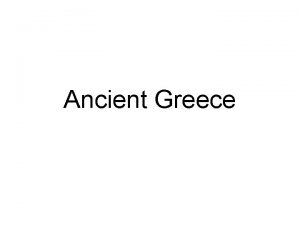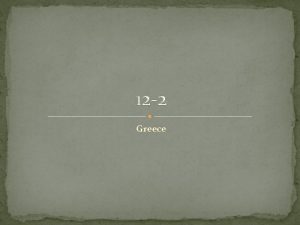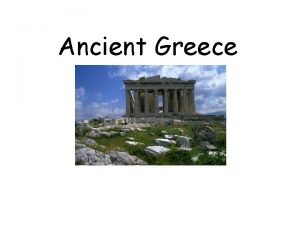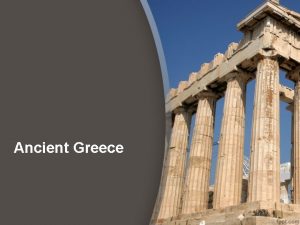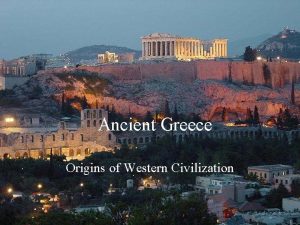History Ancient Greece Year One History UKS 2

















- Slides: 17

History Ancient Greece Year One History | UKS 2 | Ancient Greece | Ancient Greek Olympics


• I can learn about the past from sources in including art. • I can explain how the Olympics have changed over time and how they have stayed the same. • I can describe the modern day Olympic games. • I can tell you why pottery can give us information about the Ancient Olympic Games. • I can explain how important the Ancient Games were to the modern Olympic Games and say what is the same and what has changed.

What do you remember about the most recent Olympic Games? What events can you remember?

The Ancient Olympics The Olympic Games are thought to have started in 776 BC in Greece. The Games were part of a very important religious festival. The Greek Olympics inspired the modern Olympic Games which began in 1896. The Games were held every four years at Olympia, a valley in southwest Greece. The Games were held in honour of the King of the gods, Zeus. People from all over the Greek world travelled to watch and take part.

The Sacred Truce The city-states of Greece were very often at war, which made travelling around the country dangerous. Messengers were sent out from Elis, a city near Olympia, to announce a ‘sacred truce’ lasting one month before the games began. This allowed people to travel to the Olympics in safety. The truce was always honoured as the Olympic Games were a religious festival, and was much more important than war.

Events at the Games The first Olympic Games only lasted a day, and the only event was a short race from one end of the stadium to the other. Gradually, more events were added to make four days of competitions. The events included boxing, chariot, racing, discus, javelin, long jump and wrestling. One of the toughest events was the race for the hoplites, men wearing armour and carrying shields. Winners were given a wreath of leaves and a hero’s welcome back home. Winners might have been allowed to marry rich women, and enjoy invitations to parties, free meals and the best seats in theatres.

The Pankration The pankration, or all-in wrestling, was a very nasty event! All-in wrestling was very popular. There were hardly any rules! Biting and poking people’s eyes were banned, but some competitors ignored these rules! Boxing was tough too. The fighters wore leather gloves and a boxer was allowed to carry on hitting his opponent even after he’d knocked him to the ground! Cheating was punished. For instance, anyone caught trying to bribe an athlete had to pay for a bronze statue of Zeus!

Some of the evidence about the games comes from paintings, most commonly found on vases! Photo courtesy of Wikimedia Commons, Matthias Kabel

What are each of these events? Look at the pictures of different Greek vases (Download from school website). What event do you think each vase shows?

Spectators The stadium could hold around 50, 000 people. Away from the arena, most spectators had to find somewhere to pitch their tents or sleep rough, but athletes and important people had hotel rooms. It was very hot and overcrowded, with a very poor water supply, but this did not stop people from coming! The games ended with a large feast. Traders came to do business, politicians made speeches to the crowds and entertainers such as acrobats and jugglers performed.

Women at Olympia Only men, boys and unmarried girls were allowed to attend the Olympic Games. Any women caught sneaking in were punished! Unmarried women had their own festival at Olympia every four years. This was called the Heraia, held in honour of Hera, wife of Zeus. Women could compete in races, though only unmarried girls were allowed to take part. The winners were awarded crowns of sacred olive branches, the same as men.

Have a go at the following activities at home … Can you hold your own Olympic games at home? What events will you try? Could you make your own rewards for the winners? It would be great to see some photos or videos , so please send them to us at School!

What events do athletes compete in the modern Olympics that originated from the original Greek Olympic Games? Complete the Venn diagram showing ancient events, modern events and events that are in both!

Secretly choose an Ancient Greek Olympic event. Can you make a pose showing your chosen event? (like you would see on the vases!) Can we guess your event?

• I can learn about the past from sources in including art. • I can explain how the Olympics have changed over time and how they have stayed the same. • I can describe the modern day Olympic games. • I can tell you why pottery can give us information about the Ancient Olympic Games. • I can explain how important the Ancient Games were to the modern Olympic Games and say what is the same and what has changed.

 Uks yang ideal
Uks yang ideal üks hani neli nina
üks hani neli nina G8 bielany warszawa
G8 bielany warszawa Obat-obatan di uks sekolah
Obat-obatan di uks sekolah Keterkaitan pembelajaran pkn dengan ips
Keterkaitan pembelajaran pkn dengan ips News.bbc.co.uk/sport
News.bbc.co.uk/sport Pj uks
Pj uks Reringa tegese bahasa jawa
Reringa tegese bahasa jawa Act 1 scene 1 hamlet
Act 1 scene 1 hamlet Ancient greece map with labels
Ancient greece map with labels Where was ancient greece located
Where was ancient greece located The legacy of ancient greece chapter 31 answers
The legacy of ancient greece chapter 31 answers Greece geography
Greece geography Greek philosophers of physical education
Greek philosophers of physical education Legacy of ancient greece
Legacy of ancient greece Where was sparta located
Where was sparta located Map of ancient greece and surrounding areas
Map of ancient greece and surrounding areas Culture and legacy of ancient greece stations
Culture and legacy of ancient greece stations

